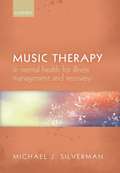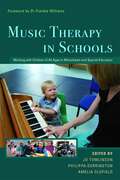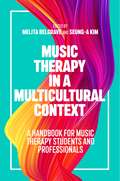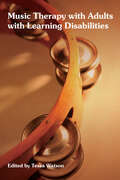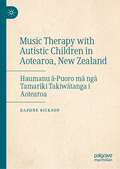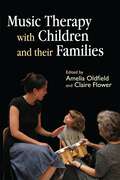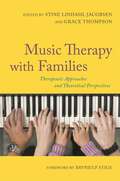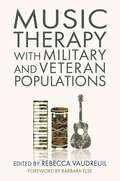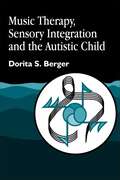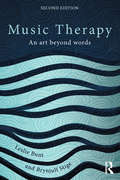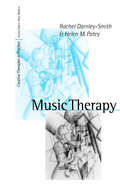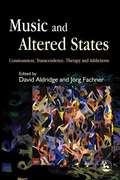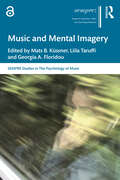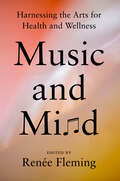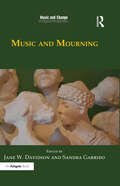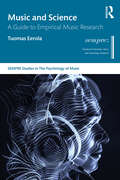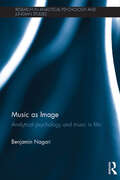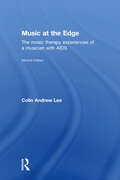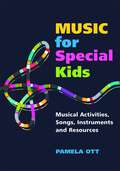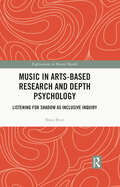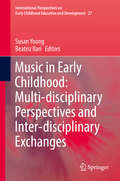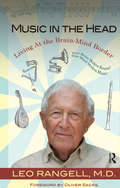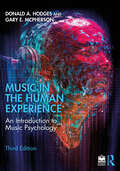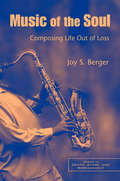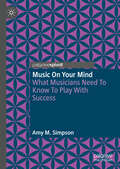- Table View
- List View
Music Therapy in Mental Health for Illness Management and Recovery
by Michael J. SilvermanMany music therapists work in adult mental health settings after qualifying. For many, it will be a challenging and even daunting prospect. Yet until now, there has been no psychiatric music therapy text providing advice on illness management and recovery. <p><p> This essential book fills the gap in the literature, providing the necessary breadth and depth to inform readers of the psychotherapeutic research base and show how music therapy can effectively and efficiently function within a clinical scenario. The book takes an illness management and recovery approach to music therapy specific to contemporary group-based practice. It is also valuable for administrators of music therapy, providing innovative theory-based approaches to psychiatric music therapy, developing and describing new ways to conceptualize psychiatric music therapy treatment, educating music therapists, stimulating research and employment, and influencing legislative policies. <p> An important aim of the book is to stimulate both critical thought and lifelong learning concerning issues, ideas, and concepts related to mental illness and music therapy. Critical thinking and lifelong learning have been - and will likely continue to be - essential aspirations in higher education. Moreover, contemporary views concerning evidence-based practice rely heavily upon the clinician's ability to think critically, seek a breadth of contradicting and confirmatory evidence, implement meta-cognition to monitor thoughts throughout processes, and synthesize and evaluate knowledge to make informed clinical decisions relevant and applicable to idiosyncratic contextual parameters. <p> For both students and clinicians in music therapy, this is an indispensable text to help them learn, develop, and hone their skills in music therapy
Music Therapy in Schools
by Amelia Oldfield Jo Tomlinson Philippa DerringtonThe majority of music therapy work with children takes place in schools. This book documents the wealth and diversity of work that music therapists are doing in educational settings across the UK. It shows how, in recent years, music therapy has changed and grown as a profession, and it provides an insight into the trends that are emerging in this area in the 21st century. Collating the experiences of a range of music therapists from both mainstream and special education backgrounds, Music Therapy in Schools explains the procedures, challenges and benefits of using music therapy in an educational context. These music therapists have worked with children of all ages and abilities from pre-school toddlers in nursery schools to teenagers preparing for further education, and address specific issues and disabilities including working with children with emotional and behavioural problems, and autistic spectrum disorders. This book will be essential reading for music therapists, music therapy students and educational professionals.
Music Therapy in a Multicultural Context: A Handbook for Music Therapy Students and Professionals
by Marisol S. Norris Angélica Pinna-Perez Kamica King Beth Robinson Leah Oswanski Natasha Thomas Maria Gonsalves SchimpfMusic therapy professionals work with diverse population groups, and this book provides therapists, and those in training, with the tools to integrate understanding of different cultural and social identities into their practice.Topics addressed include heritage, age, location, identity and health beliefs, and how to understand the dynamics of the variety of different cultures which music therapists will encounter in the course of their practice. Each chapter is written by an expert on a topic of personal interest in music therapy, explored through a multicultural lens. The chapters include anecdotes, case studies, and practical activities to try, while encouraging the reader to reflect on their own identity as a music therapist.This book is essential reading for all music therapy professionals wanting to practice in a culturally-informed manner, and respect the needs, contributions and strengths of every client.
Music Therapy with Adults with Learning Disabilities
by Tessa WatsonMusic Therapy with Adults with Learning Disabilities explores how music therapists work in partnership with people with learning disabilities to encourage independence and empowerment and to address a wide variety of everyday issues and difficulties. Comprehensive and wide-ranging, this book describes in detail the role and work of the music therapist with adults with learning disabilities. Many clinical examples are used, including casework with people with autism, asperger’s syndrome, profound and multiple learning disabilities and a dual diagnosis of learning disability and mental health problems. The book also explores issues of team work and collaborative working, considering how music therapists and their colleagues can best work together. The chapters are grouped into four sections; an introduction to current music therapy work and policy in the area, clinical work with individuals, clinical work with groups, and collaborative and team work. Guidelines for good practice are also provided. This is a thought-provoking and topical text for all those involved in work with adults with learning disabilities; it is essential reading for music therapists and fellow professionals, carers, policy makers and students.
Music Therapy with Autistic Children in Aotearoa, New Zealand: Haumanu ā-Puoro mā ngā Tamariki Takiwātanga i Aotearoa
by Daphne RicksonIn this unique text, ten cases of music therapy with autistic children (tamariki takiwātanga) are critiqued through the eyes of family members and other autism experts. Rickson uses her wealth of experience to contextualise their rich observations in a thorough review of research and practice literature, to illustrate the ways music therapists engage autistic children in the music therapy process, highlight the various ways music therapy can support their health and well-being, and demonstrate how music therapy processes align with good practice as outlined in the New Zealand Autism Spectrum Disorder Guideline.
Music Therapy with Children and their Families
by Amelia Oldfield Colette Salkeld Emma Davies Jassenka Horvat Claire Flower Helen Loth Sarah Russel Kay Sobey Joy Hasler Nicky O'Neill Rachel Bull Vince Hesketh Tiffany HughesIn the past, music therapy work with children typically took place in special schools without the family being present. More recently, music therapy has become a widespread practice, and this book reflects the variety of settings within which music therapists are now working with children together with their families. The contributors are music therapists with experience of working with children and their families in a range of different environments, such as schools, hospices, psychiatric units, child development centres and in the community. They describe their approaches to family work with client groups including children with autism, learning disabled toddlers, adopted children and looked after teenagers. Their experiences demonstrate that involving the family in a child's music therapy can be beneficial for everyone, and that it is possible to address relationship issues within the family as part of the treatment. This book will provide useful insight into the growing area of music therapy with children and their families, and will be valuable for music therapy professionals and students, as well as other medical and teaching professionals who work with families.
Music Therapy with Families: Therapeutic Approaches and Theoretical Perspectives
by Brynjulf Stige Amelia Oldfield Signe Lindstrøm Hanne Mette Ridder Margaret Barrett Stine Lindahl Jacobsen Vicky Abad Annette Baron Varvara Pasiali Grace Thompson Sören Oscarsson Tali Gottfried Kate Teggelove Kirsi Tuomi Friederike HaslbeckThis comprehensive book describes well-defined models of music therapy for working with families in different clinical areas, ranging from families with special needs children or dying family members through to families in psychiatric or paediatric hospital settings. International contributors explain the theoretical background and practice of their specific approach, including an overview of research and illustrative case examples. Particular emphasis is placed on connecting theory and clinical practice and on discussing the challenges and relevance of each model. This practical and theoretically anchored book will prove valuable for music therapists, students and researchers in the fast developing field of music therapy with families.
Music Therapy with Military and Veteran Populations
by Melissa Walker Elizabeth Freeman Jonathan Crane Donna Betts Justin Francis Brittany Costa David Otto Lisbeth Woodward Nathaniel McLaughlan Danielle Vetro-Kalseth Lisa Fagan Lori Gooding John D. Hogue Hannah Bronson Moira G. McGuire Mack Bailey Barbara Reuer Jason Danley Donna Faraone Sara Kass Megan Wong Natalie Quintana Claudia Avila Diane G. Lantston Karen Wacks Demi BullockCombining essential information, professional insights, and lived experiences, this book offers a unique overview of the use of music therapy with active-duty service members, veterans, and other military-connected populations in the United States. Contributors include music therapists specializing with the military, as well as military personnel, veterans, and their families, providing an in-depth review of the impact that music therapy can have within this community.Detailing the historical evolution of the approach within a military context, the book explores the integration of music therapy into traditional treatment programs for service members and veterans particularly those with TBI and PTSD. Chapters cover the use of music therapy in both individual and group settings, and the opportunities to facilitate therapy via virtual platforms. Throughout, it emphasises the importance of music in military culture, highlighting the benefits of this approach with military communities. Personal accounts from military families are also included, as well as discussion on continued clinical and research innovation within the field.The first book to address this growing practice, it will inspire, inform and empower therapists and professionals working with and supporting military populations.
Music Therapy, Sensory Integration and the Autistic Child
by Dorita S. BergerMusic's ability to influence emotions and moods is universally acknowledged, and music therapists have long known that stimulating the brain through the auditory system is a key to obtaining remarkable responses. Music therapy is a particularly effective tool when working with children with autism spectrum conditions, because music communicates with these children on a level where mere words cannot go. Written in a way that is both informative for the professional and accessible for parents, this book furthers the already strong case for the use of music therapy as a resource to encourage behavioural changes for the better in children with autism spectrum conditions. Placing particular emphasis upon sensory integration, the author discusses contributing factors to the behaviour of people on the autism spectrum, and, through the use of case studies, presents the latest approaches in music therapy that are enabling children with autism spectrum conditions to better cope with sensory integration.
Music Therapy: An art beyond words (Ashgate Popular And Folk Music Ser.)
by Leslie Bunt Brynjulf StigeMusic therapy is recognised as being applicable to a wide range of healthcare and social contexts. Since the first edition of Music Therapy: An art beyond words, it has extended into areas of general medicine, mainstream education and community practice. This new edition revises the historical and theoretical perspectives and recognises the growing evidence and research base in contemporary music therapy. Leslie Bunt and Brynjulf Stige document the historical evolution of music therapy and place the practice within seven current perspectives: medical, behavioural, psychoanalytical, humanistic, transpersonal, culture-centred and music-centred. No single perspective, individual or group approach is privileged, although the focus on the use of sounds and music within therapeutic relationships remains central. Four chapters relate to areas of contemporary practice across different stages of the lifespan: child health, adolescent health, adult health and older adult health. All include case narratives and detailed examples underpinned by selected theoretical and research perspectives. The final two chapters of the book reflect on the evolution of the profession as a community resource and the emergence of music therapy as an academic discipline in its own right. A concise introduction to the current practice of music therapy around the world, Music Therapy: An art beyond words is an invaluable resource for professionals in music therapy and music education, those working in the psychological therapies, social work and other caring professions, and students at all levels.
Music Therapy: Psychodynamic Music Therapy In Europe: Clinical, Theoretical And Research Approaches (Creative Therapies in Practice series)
by Helen M Patey Ms Rachel Darnley-Smith`This book is a detailed introduction to music therapy, and should be of particular interest to intending students of the subject and those wishing to pursue a career within the profession. It should be of considerable use to all with a general interest in the subject as well those making a career on music therapy' - The Organ `I found this a useful book in terms of its clarity and carefully thought out structure. It is a rich source of information and of ideas which are extremely important for the potential music therapy trainee to think about; it also makes valuable reading for more experienced therapists, bringing our minds back to some central questions about the nature of our work.... Whatever stage you may be at in your life as a music therapist, it will refresh your mind and your practice' - Eleanor Richards, Nordic Journal of Music Therapy From the Foreword: `Rachel Darnley-Smith and Helen M Patey have managed so well to tell their story of music therapy offering the framework of theory, training and professional practice, and the complimentary value of Analytical Music Therapy and Creative Music Therapy within improvization. The authors devote a whole chapter to promoting a wider understanding of improvisation, describing its value as a form of play, free association, with more or less structure depending on the form of intervention and the client's needs. There is really a valuable resource of meaningful and relevant examples from their own clinical work. These examples clearly validate and illustrate the seminal theoretical concept of the first great pioneer of music therapy in the United Kingdom, Juliette Alvin, who taught us that music is a creation of people, and therefore we can see people in their music' - Professor Tony Wigram Music Therapy is an introduction to contemporary training and practice. Written in a clear, jargon-free style, the book provides a lively source of information and ideas for all who are new to music therapy. Written by highly experienced practitioners, the book examines improvization, the principal method for music therapy, and points to the underlying assumptions about music, which shape this way of working. Two of the main music therapy approaches - Analytic Music Therapy and Nordoff- Robbins Music Therapy - are also outlined. Drawing on their own experience, the authors examine a range of clinical situations and give examples of working with children and adults with a range of needs, including autism, learning disabilities and mental health problems. They highlight the many issues which arise from day-to-day practice and explore other aspects of professional life, such as personal therapy and supervision. For anyone training or thinking of training to be a music therapist, this book provides an ideal place to start. As a guide to contemporary music therapy, it also has much to offer those already in practice.
Music and Altered States: Consciousness, Transcendence, Therapy and Addictions
by David Aldridge Lucanne Magill Joerg Fachner Dalia Cohen Tsvia HoreshThis international collection examines the opportunities for using music-induced states of altered consciousness to promote physical and mental healing, treat substance dependence, and in spiritual and palliative care. The contributors describe the successful use of altered states and their therapeutic potential, providing examples from different cultures and clinical, therapeutic and spiritual settings. Their observations cover a wide range of music types capable of inducing altered states, including polyrhythmic music, monotonous drumming, Western pop, and Arab musical schemata, complemented by theoretical and clinical approaches to applications in music therapy. This book will be a useful reference for practising music therapists, musicologists, and ethnomusicologists, students and academics in the field.
Music and Mental Imagery (SEMPRE Studies in The Psychology of Music)
by Mats B. Küssner Liila Taruffi Georgia A. FloridouDrawing on perspectives from music psychology, cognitive neuroscience, philosophy, musicology, clinical psychology, and music education, Music and Mental Imagery provides a critical overview of cutting-edge research on the various types of mental imagery associated with music. The four main parts cover an introduction to the different types of mental imagery associated with music such as auditory/musical, visual, kinaesthetic, and multimodal mental imagery; a critical assessment of established and novel ways to measure mental imagery in various musical contexts; coverage of different states of consciousness, all of which are relevant for, and often associated with, mental imagery in music, and a critical overview of applications of mental imagery in health, educational ,and performance settings. By both critically reviewing up-to-date scientific research and offering new empirical results, this book provides a unique overview of the different types and origins of mental imagery in musical contexts, various ways to measure them, and intriguing insights into related mental phenomena such as mind-wandering and synaesthesia. This will be of particular interest for scholars and researchers of music psychology and music education. It will also be useful for practitioners working with music in applied health and educational contexts.
Music and Mind: Harnessing the Arts for Health and Wellness
by Edited by Renée Fleming"This book inspires us all to immerse ourselves in the vast potential of music and other creative arts to heal our wounds, sharpen our minds, enliven our bodies, and restore our broken connections.&” —Bessel van der Kolk, #1 New York Times bestselling author of The Body Keeps the ScoreWorld-renowned soprano and arts/health advocate Renée Fleming curates a collection of essays from leading scientists, artists, creative arts therapists, educators, and healthcare providers about the powerful impacts of music and the arts on health and the human experienceChapters include: Ann Patchett, &“How to Fall in Love with Opera&” Yo-Yo Ma, &“Nature, Culture, and Healing&”Aniruddh D. Patel, &“Musicality, Evolution, and Animal Responses to Music&”Richard Powers, &“The Parting Glass"Daniel J. Levitin, &“What Does It Mean to be Musical?&” Anna Deavere Smith, &“Healing Arts&” Rosanne Cash, &“Rabbit Hole&” Rhiannon Giddens, &“How Music Shows Us What It Means to Be Human&”Robert Zatorre, &“Musical Enjoyment and the Reward Circuits of the Brain&”Concetta Tomaino, &“Music and Memory&”A compelling and growing body of research has shown music and arts therapies to be effective tools for addressing a widening array of conditions, from providing pain relief andalleviating anxiety and depression to regaining speech after stroke or traumatic brain injury, and improving mobility for people with disorders that include Parkinson&’s disease and MS.In Music and Mind Renée Fleming draws upon her own experience as an advocate to showcase the breadth of this booming field, inviting leading experts to share their discoveries. In addition to describing therapeutic benefits, the book explores evolution, brain function, childhood development, and technology as applied to arts and health.Much of this area of study is relatively new, made possible by recent advances in brain imaging, and supported by theNational Institutes of Health, major hospitals, and universities. This work is sparking an explosion of public interest in the arts and health sector.Fleming has presented on this material in over fifty cities across North America, Europe, and Asia, collaborating with leading researchers, policy-makers, and practitioners. With essays from notable musicians, writers, and artists, as well as leading neuroscientists, Music and Mind is a groundbreaking book, the perfect introduction and overview of this exciting new field.
Music and Mourning (Music and Change: Ecological Perspectives)
by Sandra Garrido Jane W. DavidsonWhile grief is suffered in all cultures, it is expressed differently all over the world in accordance with local customs and beliefs. Music has been associated with the healing of grief for many centuries, with Homer prescribing music as an antidote to sorrow as early as the 7th Century BC. The changing role of music in expressions of grief and mourning throughout history and in different cultures reflects the changing attitudes of society towards life and death itself. This volume investigates the role of music in mourning rituals across time and culture, discussing the subject from the multiple perspectives of music history, music psychology, ethnomusicology and music therapy.
Music and Science: A Guide to Empirical Music Research (SEMPRE Studies in The Psychology of Music)
by Tuomas EerolaMusic and Science provides an introduction and practical guidance for a scientific and systematic approach to music research. Students with a background in humanities may find the field hard to tackle and this accessible guide will show them how to consider using an appropriate range of methods, introducing them to current standards of research practices including research ethics, open access, and using computational tools such as R for analysis. These research methods are used to identify the underlying patterns behind the data to better understand how music is constructed and how we are influenced by music. The book focusses on music perception and the experience of music as approached through empirical experiments and by analysing music using computational tools spanning audio and score materials. The process of research, collaboration, and publishing in this area of study is also explained and emphasis is given to transparent and replicable research principles. The book will be essential reading for students undertaking empirical projects, particularly in the area of music psychology but also in digital humanities and media studies.
Music as Image: Analytical psychology and music in film (Research in Analytical Psychology and Jungian Studies)
by Benjamin NagariThrough a theoretical and practical exploration of Jungian and post-Jungian concepts surrounding image, this book moves beyond the visual scope of imagery to consider the presence and expression of music and sound, as well as how the psyche encounters expanded images – archetypal, personal or cultural – on both conscious and unconscious levels. By closely examining music in film, Nagari considers music’s complementary, enhancing, meaningful, and sometimes disruptive, contribution to expressive images. Chapters present a Jungian approach to music in film, highlighting how ‘music-image’ functions both independently and in conjunction with the visual image, and suggesting further directions in areas of research including music therapy and autism. Divided into three cumulative parts, Part I explores the Jungian psychological account of the music-image; Part II combines theory with practice in analysing how the auditory image works with the visual to create the ‘film as a whole’ experience; and Part III implements a specific understanding of three individual film cases of different genres, eras and styles as psychologically scrutinised ‘case histories’. Music as Image will be of interest to academics and students in the fields of applied psychoanalysis and Jungian psychology, music, film and cultural studies. With implications for music therapy and other art-based therapies, it will also be relevant for practising psychotherapists.
Music at the Edge: The Music Therapy Experiences of a Musician with AIDS
by Colin Lee Colin Andrew LeeMusic at the Edge invites the reader to experience a complete music therapy journey through the words and music of the client, and the therapist’s reflections. Francis, a musician living with AIDS, challenged Colin Andrew Lee, the music therapist, to help clarify his feelings about living and dying. The relationship that developed between them enabled Francis the opportunity to reconsider the meaning of his life and subsequent physical decline, within a musical context. First published in 1996, Music at the Edge is a unique and compelling music therapy case study. In this new edition of the highly successful book, Colin retains the force of the original text through the lens of contemporary music therapy theory. This edition also includes more detailed narrative responses from the author and his role as a therapist and gay man. Central to the book are the audio examples from the sessions themselves. The improvisations Francis played and his insightful verbal explorations provide an extraordinary glimpse into the therapeutic process when working in palliative and end-of-life care. This illuminating book offers therapists, musicians, related professionals and those working with, or facing, illness and death a unique glimpse into the transcendent powers of music. It is also relevant to anyone interested in the creative account of a pianist’s discovery of life and death through music.
Music in Arts-Based Research and Depth Psychology: Listening for Shadow as Inclusive Inquiry (ISSN)
by Shara BrunThis book addresses an existing gap in academic arts-based research, whereby, rather than exploring music as an effective therapeutic intervention, it is explored as the central medium or tool of inquiry.Integrating heuristic, hermeneutic, and arts-based grounded theory methodologies, the book conceptualizes and describes the practice of Sonic Stretching as an in-depth example of using sound as an effective and systematic research tool. Stemming from evidence-based insights, the book explores and explains ways in which music and sound can be utilized in arts-based research (ABR) in all disciplines, as opposed to only being used among professional musicians and those operating within music studies. It points to some of the obstacles that have previously prevented this from happening more broadly and, in doing so, aims to help bridge the conspicuous gap in ABR studies, where music and sonic imagination should be.Offering a clear and well-presented example for integrating music and sound into processes of depth psychological inquiry and addressing the impact of colonialization upon embodied knowledge in music and academic research, it will appeal to scholars and researchers working at the intersection of psychology, music studies, education, social justice, and research methods.
Music in Early Childhood: Multi-disciplinary Perspectives And Inter-disciplinary Exchanges (International Perspectives on Early Childhood Education and Development #27)
by Susan Young Beatriz IlariThis book examines four main areas of music in early childhood: the traditions of music for young children, their capacities for music, the way they make music with others, and constructed and mediated musical childhoods. It studies several themes in detail, including music making in the home and family life, various musical experiences in schools, day cares, and the community at large in several locations around the globe. It looks at technology and diverse musical repertoires, as well as innovative pedagogies, children’s agency, and brain research. Expanding on the knowledge bases on which early childhood music education typically draws, the book brings together contributions from a range of authors from diverse fields such as education, psychology, sociology, cultural studies, anthropology, philosophy, ethnomusicology, and the neurosciences. The end result is a volume that offers a broad and contemporary picture of music in early childhood.
Music in the Head: Living at the Brain-Mind Border
by Leo RangellThis book turns out to have a scientific relevance and value that will similarly interest many, not only those in the specialized field of neuroscience but very individual who has a brain and a mind and wonders about them.
Music in the Human Experience: An Introduction to Music Psychology
by Donald A. Hodges Gary E. McPhersonMusic in the Human Experience: An Introduction to Music Psychology, Third Edition, explores the ways in which we make sense of music and how we respond to it—cognitively, physically, and emotionally. Written by musicians, for musicians, while incorporating findings from biology, anthropology, sociology, physics, philosophy, and education, the text presents musical experiences as widely varied and hugely complex affairs. How did human beings come to be musical creatures? Why do people have emotional responses to music? In Music in the Human Experience, the authors seek to understand and explain these musical phenomena that lie at the core of what it means to be human.New to the Third Edition: New co-author, Gary E. McPherson Fresh discussions on in-demand topics: social justice in music, fitness for musicians, constructivism, and more Increased recognition of non-Western music and musical experiences A digital overhaul of the accompanying multimedia tutorials, now available via www.musicinthehumanexperience.com Refined and updated content throughout
Music of the Soul: Composing Life Out of Loss (Series in Death, Dying, and Bereavement)
by Joy S. BergerMusic of the Soul guides the reader through principles, techniques, and exercises for incorporating music into grief counseling, with the end goal of further empowering the grieving person. Music has a unique ability to elicit a whole range of powerful emotional responses in people - even so far as altering or enhancing one's mood - as well as physical reactions. This interdisciplinary text draws in equal parts from contemporary grief/loss theory, music therapy research, historical examples of powerful music, case studies, and both self-reflecting and teaching exercises. Music is as much about beginnings as endings, and thus the book moves through life’s losses into its new beginnings, using musical expression to help the bereaved find meaning in loss and hurt, and move forward with their lives. With numerous exercises and examples for implementing the use of music in grief counseling, the book offers a practical and flexible approach to a broad spectrum of mental health practitioners, from thanatologists to hospice staff, at all levels of professional training and settings.
Music on Your Mind: What Musicians Need to Know to Play with Success
by Amy M. SimpsonThis book provides musicians, students, and teachers a practical guide for optimal music learning, practice, memorization, and performance by the application of modern neuro-music research. Uncover the best, scientifically researched techniques, supported by researchers and musicians alike, that will empower you to learn thoroughly, practice optimally, and perform at your best. Do you know how people learn? Do you know how people improve motor-skills for playing an instrument? Do you know how to focus attention and stay motivated? Discover the essential answers you need to revitalize and optimize your daily work as a musician. By applying the best methods and knowing why they work, you, too, can create successful practice routines with positive, rewarding, results. Know the best techniques for preparing expert music performance. Learn how to play with success!
